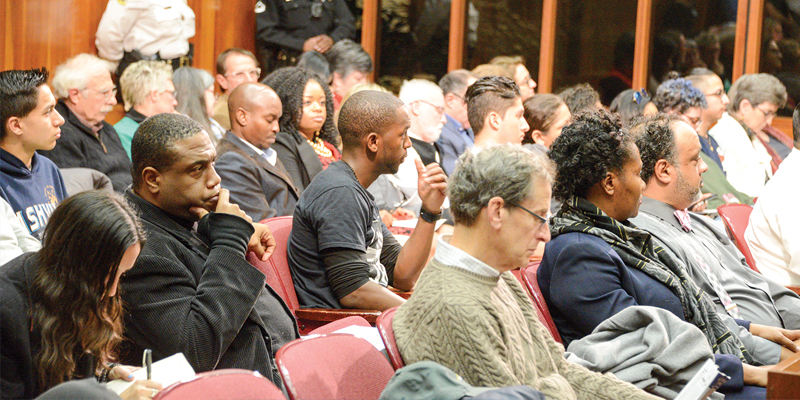The first town hall-style meeting of the Greensboro City Council on Tuesday, Jan. 9 in the Council Chambers appeared to go without a hitch.
According to Mayor Nancy Vaughan, 17 people spoke and the meeting, which began shortly after 5:30 p.m., adjourned at 8:05.
This was the first attempt at a new City Council plan to deal with the often raucous meetings that usually resulted from speakers from the floor on nonagenda items.
In the past, all City Council meetings have begun with a public comment period where speakers can come to the podium and speak about any topic they wish. Starting Tuesday, the City Council won’t have a public comment period at its business meeting on the third Tuesday of the month. The belief is that the public forum portion of the meeting often got the meeting off to such a bad start it never recovered.
People will still be allowed to speak on agenda items at all regular meetings.
Most of the speakers on Tuesday night urged the City Council to do something for the Deferred Action for Childhood Arrivals (DACA) immigrants, which is definitely not a city issue.
The City Council did agree to vote on a resolution in support of a Clean Dream Act at its regular meeting next Tuesday, Jan. 16.
After all of the speakers on the Dream Act had spoken, City Councilmember Michelle Kennedy said, “Dreamers and their families absolutely deserve our support.” She added, “I believe that no human being is illegal.”
Vaughan urged people to call their congressmen. She said, “I support the resolution, but it is really nothing more than a piece of paper.”
She added, “I hope that Congress will have a heart and create a path to citizenship for everybody.”
Councilmember Marikay Abuzuaiter said, “I agree with the mayor 100 percent.”
Councilmembers Goldie Wells, Yvonne Johnson, Sharon Hightower and Tammi Thurm all offered their support.
The City Council likes to pass resolutions, but the idea that a resolution from the Greensboro City Council is going to change national policy is a bit optimistic.
The second most popular topic for the speakers – who were given five minutes each to address the City Council – was the proposed downtown parking decks.
A number of speakers from Democracy Greensboro cited concerns about the decks and the lack of information available to the public before the decision to spend $60 million to build two decks was made. Some questions on financing the decks were expressed, and the speakers pointed out that the City Council has been far from open and transparent on the complicated agreement that governs the deck to be built on Market and Davie streets with a Westin Hotel built on top of the deck.
City Manager Jim Westmoreland said that all the public documents concerning the parking decks could now be found on the city website.
However, no one asked about the $200,000 in legal fees that are part of the agreement to design the deck at Market and Davie streets. It seems odd that designing a parking deck would require $200,000 in legal fees, but that is listed as one of the costs, which brings the total for the design to $2 million.
According to City Attorney Tom Carruthers, the $200,000 in legal expenses listed in the contract is a mistake. Carruthers said it was supposed to be removed and was not, so the city won’t be billed for $200,000 in legal fees.
But then there is another oddity in the agreement – the city is paying the developer $160,000 to administer the parking deck design, which is 10 percent of the total cost of the design minus the administration fee and the legal fees.
This appears to be a fee that could have been negotiated away.
The engineering firm Kimley-Horn was hired to design the deck. From the invoices, it appears the administration – for which the city is paying the developer $160,000 – consists mainly of accepting the invoices from Kimley-Horn and forwarding them to the city. Why couldn’t the city have hired Kimley-Horn to design the deck, cut out the middleman and saved $160,000? The city is not simply paying for the design of the deck, but paying the developer to have it designed. It almost appears that the bill was padded to bring it up to $2 million by adding the $200,000 in legal fees that reportedly won’t be paid and $160,000 in administrative fees that are already being paid.
Then there is another question about a public parking deck that should be answered. Both the Dixie Building on the corner of South Elm Street and February 1 Place and the 101 Elm Street on the corner of South Elm and Market streets will have bridges to the parking deck. Were the other property owners on South Elm that will have the deck at their back door offered this same convenience?
It would appear that the value of those buildings will be enhanced by having the city provide easy access to the parking deck, while Cone Denim Entertainment Center owned by Rocky Scarfone is going to have the value of his building diminished because the city plans to condemn the easement to the back door of Cone Denim and pay Scarfone $55,000 for the easement.
Scarfone said that he plans to sue the city to preserve the right of ingress and egress to his property.
The city started negotiating with Scarfone and his attorney Amiel Rossabi about the easement in July, but the design of the deck began in April.
One of the sticking points in those negotiations according to a participant was that the deck had already been designed and, although alterations could be made, the city was limited in what it could do without a complete redesign.
The lawsuit on behalf of Scarfone is expected to be filed by Rossabi by the end of the month.

